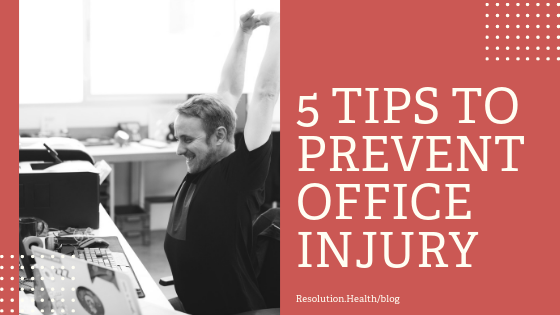Many of the injuries our clients seek relief from are caused by office work. Low back pain, wrist pain, neck pain, shoulder pain, headaches…they stem from sitting for up to 15 hours a day. (Yep, even driving home and kicking back on the couch after work adds to the stress that sitting causes your body.)
Who knew working in an office could be so dangerous?
We asked our therapists for ways to prevent office injury.
- Be mindful of your posture. Is your back straight? Does your neck hunch forward? Envision putting your shoulders in pockets at the back of your shirt and hold your back straight.
- Take regular stretch breaks. Set a timer on your phone to remind yourself to get up and stretch. Doing this every 30-60 minutes will do wonders. Stretch your wrists, neck, and lower back. Do door frame stretches for your pectoral (chest) muscles (make sure you are not straining your neck while performing them). Strengthen your rhomboids by standing and pulling your elbows together behind your back. Don’t lift your shoulders or you are actually engaging your upper traps, which are already tight from sitting.
- Engage your core when sitting and walking. If you use a lumbar support, but don’t engage your core, that lumbar support doesn’t actually do much for you. Think of flexing your stomach so it hugs your spine. Don’t forget to also use your core while walking, which reduces the stress on your hips, knees and low back.
- Stand instead of sit. Working at a standing desk will get your blood flowing more by engaging your leg muscles. But your legs and feet will get sore. Instead of doing conspicuous tip-toe calf raises, you could invest in an anti-fatigue mat. The anti-fatigue mat is cushioned, which makes your leg muscles continuously adjust to keep you standing upright. Muscle contraction leads to blood flow, which is what you want.
- Invest in structural integration sessions. These sessions help you learn how to hold your body better. They also release the fascia (connecting tissue) that could be keeping you “stuck” in a poor posture position.
